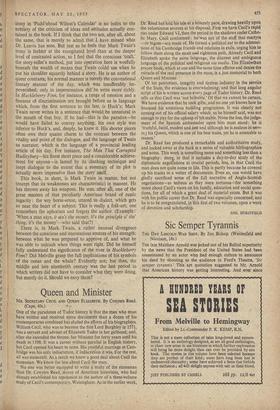Queen and Minister
MR. SECRETARY CECIL AND QUEEN ELIZABETH. By Conyers Read.
ONE of the paradoxes of Tudor history is that the man who must have written and received more documents than a dozen of his contemporaries combined has eluded the efforts of his biographers. William Cecil, who was to become the first Lord Burghley in 1571, was a servant and adviser of Elizabeth Tudor in her girlhood; and, after she ascended the throne, her Minister for forty years until his death in-1598. It was a career without parallel in English history, but Cecil opened his heart to none. His youthful marriage at Cam- bridge was his only indiscretion, if indiscretion it was.'For the rest, all was statecraft. As a result we know a good deal about Cecil the statesman. We know far less about Cecil the man.
No one was better equipped to write a study of the statesman than Dr. Conyers Read, doyen of American historians, who had already established his reputation as the author of a three-volume study of Cecil's contemporary, Walsingham. As in the earlier work,
Dr. Read has told his tale at a leisurely pace, drawing heavily upon the voluminous sources at his disposal. First we have Cecil's rapid rise under Edward VI, then the period in the shadows under Catho- lic Mary. Cecil conformed : he was not of the stuff that martyrs —or bigots—are made of. He turned a political .ear to the admoni- tions of his Cambridge friends and relations in exile, urging him to follow them along the strait and righteous path. Already Cecil and Elizabeth spoke the same language, the discreet and ambiguous language of the political and religious via media. The Elizabethan prayer book, which at one and the same time affirms and denies the miracle of the real presence in the mass, is a, just memorial to both Queen and Minister.
Of his patriotism, integrity and tireless industry in the service of the State, the evidence is overwhelming; and that long angular script of his is written across every page of Tudor history. Dr. Read tells us that Cecil was 'not bribable.' Of that we cannot be certain. We have evidence that he took gifts; and no one yet knows how he financed his ambitious building programme. It was clearly not coming out of his official salary which, as he himself said, was not enough to pay for the upkeep of hrs stable. None the less, the judge- ment of the Spanish ambassador upon him must stand : he is 'truthful, lucid, modest and just and although he is zealous in serv- inj his Queen, which is one of his best traits, yet he is amenable to reason.'
Dr. Read has produced a remarkable and authoritative study, and tucked away at the back is a series of valuable bibliographies and notes. This work is something more and something less than a biography : mori, in that it includes a day-to-day study of the diplomatic negotiations at crucial periods, less, in that Cecil. the man does not quite come to life. This is partly because he covered up his tracks in a welter of documents. Even so, one would have gladly sacrificed some of the full narrative of Anglo-Scottish negotiations—as tedious' as they were tortuous=for something more about Cecil's views on his family, education and social ques- tions, for all of which a great deal of material exists. But it was with his public career that Dr. Read was especially concerned; and he is to be congratulated, in this first of two volumes, upon wwork of devotion and scholarship.
JOEL HURSTFIELD










































 Previous page
Previous page